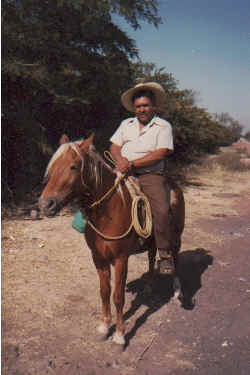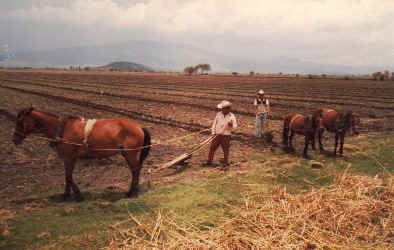Classical Marxism and the Agrarian Question
Introduction
 Among Marxists, a central issue in early debates about capitalist development was the "Agrarian question". The nub of the matter here wasn’t really economic. What really preoccupied the classical Marxist thinkers was a political question: would the peasants act as allies in the struggle to achieve socialism, or were they ultimately a reactionary, counter-revolutionary element? Perhaps some segments of the peasantry would ally with the industrial proletariat, even if others wouldn’t... and so on. The most important point to grasp here is that Marx and his followers saw capitalism as an historically progressive force in the objective sense. Capitalism, per se, was an exploitative and inhuman system. But, it also created the possibility of a type of society which was materially more prosperous and infinitely more humane than its predecessors. Capitalism produced an historically unprecedented development of the material forces of production, a quantum leap in Humankind’s mastery over nature. It also created the proletariat, what Marx, in his more Hegelian moments, called the first universal class, the class which was capable of abolishing class society itself, with it, human exploitation. In other words, this was an optimistic, modernist perspective on history.
Among Marxists, a central issue in early debates about capitalist development was the "Agrarian question". The nub of the matter here wasn’t really economic. What really preoccupied the classical Marxist thinkers was a political question: would the peasants act as allies in the struggle to achieve socialism, or were they ultimately a reactionary, counter-revolutionary element? Perhaps some segments of the peasantry would ally with the industrial proletariat, even if others wouldn’t... and so on. The most important point to grasp here is that Marx and his followers saw capitalism as an historically progressive force in the objective sense. Capitalism, per se, was an exploitative and inhuman system. But, it also created the possibility of a type of society which was materially more prosperous and infinitely more humane than its predecessors. Capitalism produced an historically unprecedented development of the material forces of production, a quantum leap in Humankind’s mastery over nature. It also created the proletariat, what Marx, in his more Hegelian moments, called the first universal class, the class which was capable of abolishing class society itself, with it, human exploitation. In other words, this was an optimistic, modernist perspective on history.
The problem posed by the peasantry, as far as Marx was concerned, was that they seemed in danger of standing in opposition to the full development of capitalism, and might therefore stand in opposition to the achievement of the socialist millenium. As far as Marx was concerned, the development of the capitalist mode of production was dependent on the dispossession and proletarianization of the peasantry. Peasants who succeeded in resisting that process, and clung on to their land by means of armed resistance, for example, might, in fact, be delaying the possibility of socialism being achieved, however worthy their struggle might be in its own terms. As both Marx and Lenin suggested, peasant producers might also sustain the continued dominance of archaic, merchant capitalist, forms of rural exploitation, or the dominance of landlord classes. The latter might manipulate the peasantry for reactionary political ends, and, by definition, archaic forms of capitalism had to be replaced by industrial capitalism if history was to progress. Ultimately, any process which checked the growth of the proletariat was putting off the day when all humanity could be liberated finally and completely from exploitation.
Naturally, this way of putting it doesn’t really reflect the language the classical Marxists used, because they had to show some sympathy with the plight of the rural poor. But it is what lurked away underneath their thinking on the Agrarian question


 Among Marxists, a central issue in early debates about capitalist development was the "Agrarian question". The nub of the matter here wasn’t really economic. What really preoccupied the classical Marxist thinkers was a political question: would the peasants act as allies in the struggle to achieve socialism, or were they ultimately a reactionary, counter-revolutionary element? Perhaps some segments of the peasantry would ally with the industrial proletariat, even if others wouldn’t... and so on. The most important point to grasp here is that Marx and his followers saw capitalism as an historically progressive force in the objective sense. Capitalism, per se, was an exploitative and inhuman system. But, it also created the possibility of a type of society which was materially more prosperous and infinitely more humane than its predecessors. Capitalism produced an historically unprecedented development of the material forces of production, a quantum leap in Humankind’s mastery over nature. It also created the proletariat, what Marx, in his more Hegelian moments, called the first universal class, the class which was capable of abolishing class society itself, with it, human exploitation. In other words, this was an optimistic, modernist perspective on history.
Among Marxists, a central issue in early debates about capitalist development was the "Agrarian question". The nub of the matter here wasn’t really economic. What really preoccupied the classical Marxist thinkers was a political question: would the peasants act as allies in the struggle to achieve socialism, or were they ultimately a reactionary, counter-revolutionary element? Perhaps some segments of the peasantry would ally with the industrial proletariat, even if others wouldn’t... and so on. The most important point to grasp here is that Marx and his followers saw capitalism as an historically progressive force in the objective sense. Capitalism, per se, was an exploitative and inhuman system. But, it also created the possibility of a type of society which was materially more prosperous and infinitely more humane than its predecessors. Capitalism produced an historically unprecedented development of the material forces of production, a quantum leap in Humankind’s mastery over nature. It also created the proletariat, what Marx, in his more Hegelian moments, called the first universal class, the class which was capable of abolishing class society itself, with it, human exploitation. In other words, this was an optimistic, modernist perspective on history.